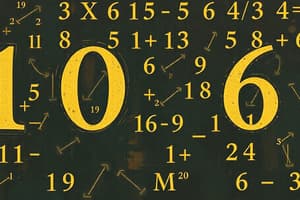Podcast
Questions and Answers
Which of the following best describes irrational numbers?
Which of the following best describes irrational numbers?
- Any number that is not a complex number.
- Numbers that cannot be expressed as fractions of two integers. (correct)
- Numbers that can be expressed as fractions.
- Whole numbers including zero.
What is the result of $8 + (-3)$?
What is the result of $8 + (-3)$?
- $8$
- $5$ (correct)
- $3$
- $11$
Which property is illustrated by the equation $a + b = b + a$?
Which property is illustrated by the equation $a + b = b + a$?
- Commutative property (correct)
- Distributive property
- Associative property
- Identity property
In what form can complex numbers be expressed?
In what form can complex numbers be expressed?
Which of the following is an example of an arithmetic operation?
Which of the following is an example of an arithmetic operation?
What does differential calculus primarily deal with?
What does differential calculus primarily deal with?
Which trigonometric function is defined as the ratio of the opposite side to the hypotenuse in a right triangle?
Which trigonometric function is defined as the ratio of the opposite side to the hypotenuse in a right triangle?
What distinguishes integers from whole numbers?
What distinguishes integers from whole numbers?
Flashcards
Natural Numbers
Natural Numbers
The counting numbers (1, 2, 3, ...)
Whole Numbers
Whole Numbers
Natural numbers plus zero (0, 1, 2, 3, ...)
Integers
Integers
Whole numbers and their opposites (...-3, -2, -1, 0, 1, 2, 3, ...)
Rational Numbers
Rational Numbers
Signup and view all the flashcards
Irrational Numbers
Irrational Numbers
Signup and view all the flashcards
Real Numbers
Real Numbers
Signup and view all the flashcards
Imaginary Numbers
Imaginary Numbers
Signup and view all the flashcards
Complex Numbers
Complex Numbers
Signup and view all the flashcards
Addition
Addition
Signup and view all the flashcards
Subtraction
Subtraction
Signup and view all the flashcards
Multiplication
Multiplication
Signup and view all the flashcards
Division
Division
Signup and view all the flashcards
Exponentiation
Exponentiation
Signup and view all the flashcards
Study Notes
Fundamental Concepts
- Mathematics is the study of quantity, structure, space, and change.
- It involves the use of logic and abstract reasoning to understand and solve problems.
- Different branches of mathematics exist, each focusing on specific aspects of these concepts.
Number Systems
- Natural numbers (counting numbers): 1, 2, 3, ...
- Whole numbers: 0, 1, 2, 3, ...
- Integers: ..., -3, -2, -1, 0, 1, 2, 3, ...
- Rational numbers: numbers that can be expressed as a fraction p/q, where p and q are integers and q is not zero.
- Irrational numbers: numbers that cannot be expressed as a fraction of two integers. Examples include π (pi) and the square root of 2.
- Real numbers: include both rational and irrational numbers.
- Imaginary numbers: numbers containing the imaginary unit "i" where i2 = -1.
- Complex numbers: numbers that can be expressed in the form a + bi, where a and b are real numbers and i is the imaginary unit.
Arithmetic Operations
- Addition (+): combining quantities.
- Subtraction (-): finding the difference between quantities.
- Multiplication (× or ⋅): repeated addition.
- Division (÷ or /): separating a quantity into equal parts.
- Exponentiation (^): repeated multiplication.
- Properties of operations (commutative, associative, distributive).
Algebra
- Variables and expressions: representing unknown quantities with symbols.
- Equations and inequalities: statements of equality or inequality.
- Solving equations and inequalities: finding the values of the variables that satisfy the equation or inequality.
- Polynomials: expressions involving variables and exponents.
- Factoring: rewriting an expression as a product of simpler expressions.
Geometry
- Shapes and figures: points, lines, angles, polygons, circles, etc.
- Measurements: lengths, areas, volumes, angles.
- Geometric figures properties: identifying and classifying shapes, exploring relationships between their components.
Trigonometry
- Study of triangles and relationships between their sides and angles.
- Trigonometric functions (sine, cosine, tangent, etc.).
- Applications in various fields like physics and engineering.
Calculus
- Differential calculus: deals with rates of change and slopes of curves.
- Integral calculus: deals with accumulation and areas under curves.
- Applications: optimization problems, motion analysis, and finding areas and volumes.
Discrete Mathematics
- Study of structures and quantities that are discrete rather than continuous, like graphs, trees, and sets.
- Concepts like combinations, permutations, graph theory, and logic.
Statistics and Probability
- Collection, organization, analysis, and interpretation of numerical data.
- Probability: quantifying the likelihood of events happening.
- Statistical measures: mean, median, mode, variance, standard deviation.
Studying That Suits You
Use AI to generate personalized quizzes and flashcards to suit your learning preferences.
Description
This quiz covers the essential concepts of mathematics, including an overview of number systems and various arithmetic operations. It explores different types of numbers such as natural, whole, integers, rational, irrational, real, imaginary, and complex numbers. Test your understanding of these fundamental mathematical principles.




